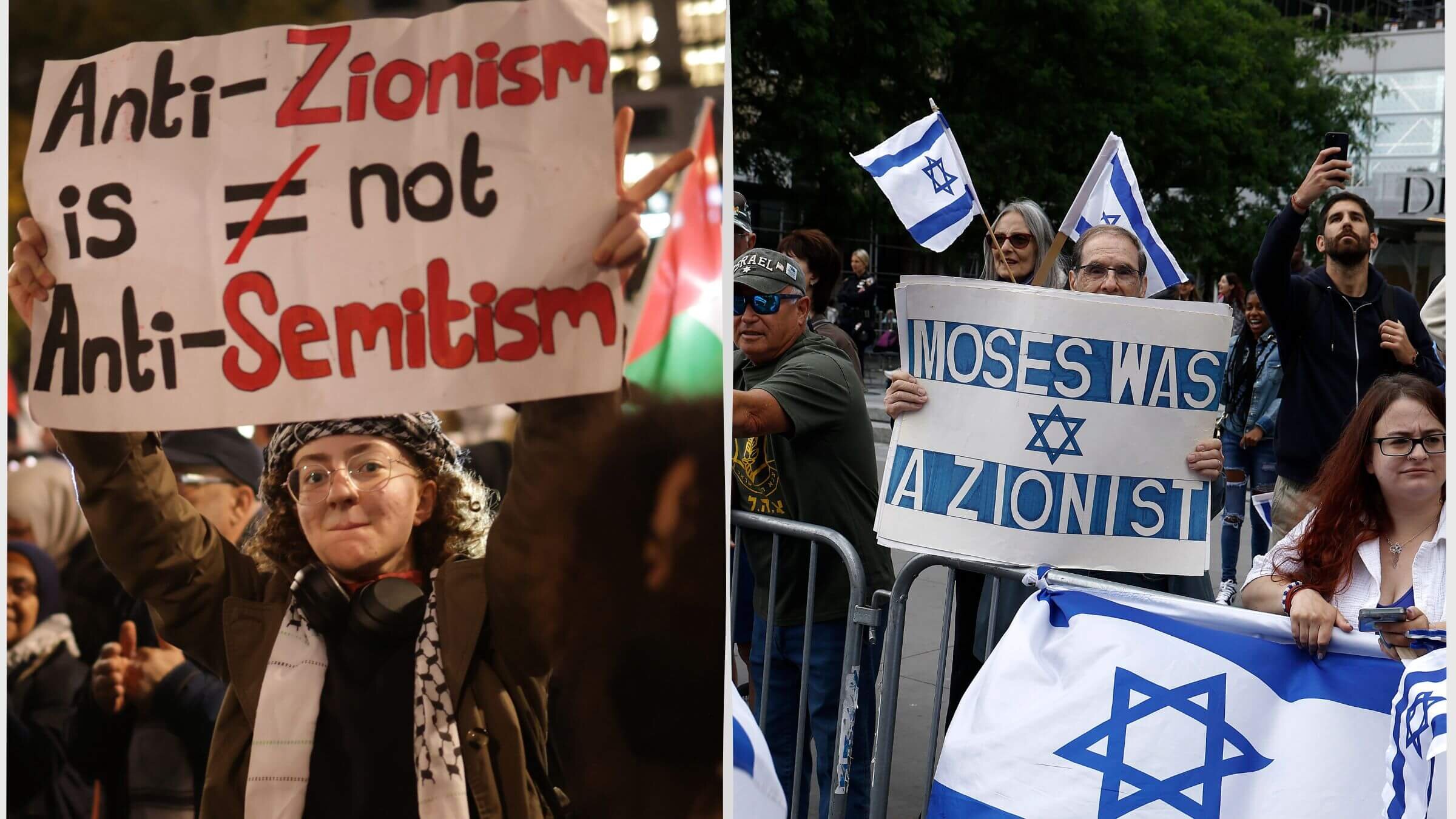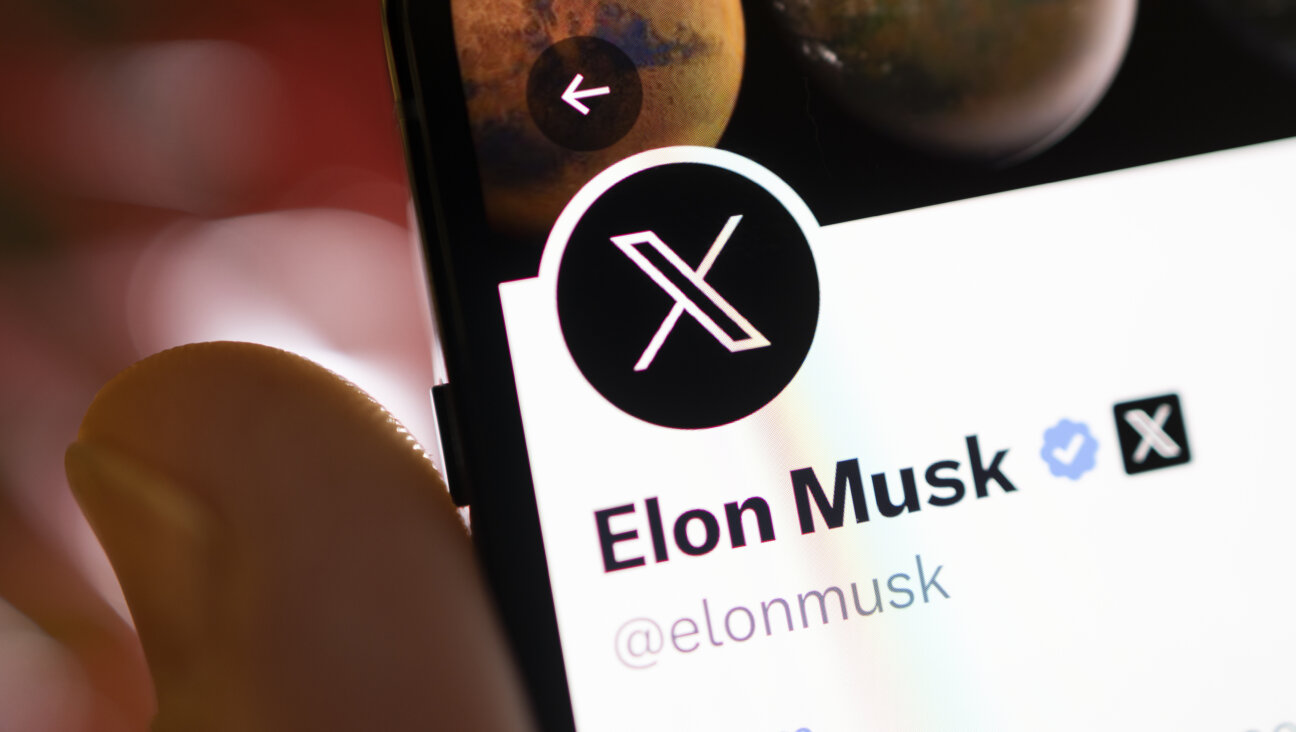Why it’s time to leave the labels of ‘Zionist’ and ‘anti-Zionist’ behind
Instead of aligning on shared values, the Jewish community is divided by the term “Zionist”

L – A woman holds a sign “Anti-Zionism is not Anti-Semitism” at a pro-Palestinian march in Berlin, Germany, Nov. 4, 2023; R – A man holds a sign saying “Moses was a Zionist” at the Israel Day Parade in New York, June 4, 2023. Photo-illustration by Nora Berman/Getty Images
Zionist and Anti-Zionist What Does it All mean?
As war has raged across Israel and Gaza, there’s been a parallel war raging within my synagogue.
On the listserv, emails have ricocheted back and forth as members of different backgrounds, histories and relationships with Israel have clashed with one another. One fight exploded after an open letter urging the congregation to take a more forceful pro-Palestinian stance circulated on the list. Another kicked off when a member shared a Physicians for Human Rights report about the sexual violence that unfolded on Oct. 7.
For some of my fellow congregants, it feels as though they are being asked to share a sacred space with people who ignore or even justify the brutal slaughter of our fellow Jews. Others have said they’re being asked to pray next to people whose concern for human rights ends when the victims are Palestinian and the perpetrators are Jews.
Predictably, labels like Zionist and anti-Zionist have been tossed back and forth: the Zionists accused of refusing to appreciate Palestinian pain and suffering; the anti-Zionists accused of doing the same to other Jews.
I am a non-Zionist — a label that I use because my feelings about Jewish history, self-determination, and the state of Israel feel far too complex to declare myself “for” or “against” Zionism. It’s been troubling to see how often semantics seem to obscure shared values.
A shul divided
As I’ve watched arguments unfold across my synagogue listserv, I’ve noticed that, ironically, the synagogue’s self-proclaimed “Zionists” and “anti-Zionists” aren’t actually in disagreement about their ultimate hopes for Israelis and Palestinians. As weighty as these labels have become to many Jews both within and outside of my congregation, they rarely seem to illustrate as much as we’ve been led to believe.
The arguments that have unfolded are rarely about substantive issues like a cease-fire, hostage return or Palestinian human rights. More often than not, it feels far more like people are simply fighting over the use of the labels “Zionist” and “anti-Zionist.”
The heart of the matter is that Zionism and anti-Zionism simply cannot be reduced to simple, straightforward concepts. Although Zionism is, at its core, a belief in the Jewish right to self-determination and an ancient connection between Judaism and the Holy Land, in practice, that can manifest in a variety of different desires and stated outcomes.
On the face of it, these two schools of thought should inject some clarity into the conversation around the Israeli-Palestinian conflict. There is over a century of Zionist and anti-Zionist writing and theorizing on the relationship between Jews, the Holy Land and the modern state of Israel that people could engage with today.
Yet instead of creating space for deeper conversation, these terms of “Zionist” and “anti-Zionist” have been wielded as a way of closing off any dissent, packaged into simplistic catchphrases that only make sense if you already know what the speaker understands Zionism or anti-Zionism to mean.
Throughout its decades of existence, my mid-sized, nondenominational shul in Brooklyn has been an “open tent” that offers a spiritual home for liberal Zionists, non-Zionists, and anti-Zionists alike. But after Oct. 7, that coalition has felt far more fragile.
Values over labels
Members of the synagogue leadership have taken steps to defuse the tensions: listserv posts referencing the conflict must be explicitly labeled. A task force focused on the conflict hosted processing sessions both in person and over Zoom, with congregants given the opportunity to share their complicated thoughts and feelings in a supportive, judgment-free zone. At times when things have gotten especially heated, I’ve personally chimed into the conversation asking people to remember that we’re all hurting, that we’re all suffering, that we’re all traumatized.
And yet, a part of me wonders if, perhaps, there’s another step that we could take. What if, instead of fixating on the labels of “Zionist” and “anti-Zionist” and ascribing negative or positive qualities to each, we abandoned those labels entirely?
What if, rather than asking Jews to sort ourselves into one of two camps, we chose instead to talk about the values and history that shape our connections to Israel and Palestine, and the hopes we have for the future of the region?
Alienating allies
Because quite frankly, the alternative hasn’t been particularly helpful for anyone. When the U.S. House of Representatives adopted a resolution in early December declaring that “anti-Zionism is antisemitism,” at least three Jewish members of Congress protested the resolution, arguing that it reduced the violence of antisemitism to a “political game,” and defamed anti-Zionist Jews in the process.
On the other end of the equation, leftists who’ve refused to work with Zionists have alienated some powerful potential allies: Israel’s small but vocal community of anti-occupation and anti-war activists, who advocate for Palestinian safety not in spite of, but because of, their connection to Israel and Zionism.
For the most aggressive religious Zionists, Zionism is a call for Jews to take back every bit of land between the Nile and the Euphrates, engaging in ethnic cleansing and genocide as that mission may require. On the other end of the Zionist spectrum are groups like the New Israel Fund, which advocate for a “better Israel” that is democratic, diverse and committed to human rights — not in spite of its Jewish heritage, but because of it. Liberal Zionists like NIF also vehemently oppose the religiously expansionist Zionism of the settler movement — making the attempt to encapsulate diverse worldviews of these two disparate groups under the header of “Zionism” feel both imprecise and foolish.
The Zionists within my shul are more aligned with J Street than with Jewish settlers in the West Bank, making them an odd proxy for the most violent, right-wing breed of Jewish nationalist. No one in my synagogue would openly talk of the ethnic cleansing of Palestinians as a desirable outcome. And while in-person discussions have made it clear that they often have substantive disagreements and different worldview from anti-Zionists, it rarely feels like the gap is so wide that anyone is actually the polar opposite of the other.
Different definitions of Zionist / Zionism
Because the thing that is often ignored when we talk about Zionist and anti-Zionist is that by definition, anti-Zionism is in conversation with Zionism; the meaning of anti-Zionism is inherently tied to whatever form of Zionism it happens to be responding to.
For those who see Zionism as nothing more than a plea for Jews to have access to the same self-determination that many groups around the world take for granted, it is hard to see how anti-Zionism isn’t antisemitic. And yet at the same time many young anti-Zionists — and especially Jewish anti-Zionists — do not see the ideology as a rejection of Jewish rights, but rather an affirmation of the Palestinian right to self-determination, freedom and basic dignity; not an opposition to Jewish self-determination, but a rejection of apartheid, military occupation, and the military strikes that have killed thousands of Palestinian civilians.
In the many conversations that I have had with a range of Zionists, anti-Zionists and non-Zionists like myself, it has become clear to me that while there are always extremist outliers, there are far more people who desire only to see Israel and Palestine form a lasting, meaningful peace. They want a political structure that grants everyone with a connection to the land the freedom to live there in safety and security, with full enfranchisement and access to all manner of rights.
Some people who hold that view insist that it is a Zionist one, as it recognizes the Jewish right to exist safely and peacefully within the boundaries of the Holy Land. Others insist that it is necessarily anti-Zionist, as any respect for Palestinian rights is incompatible with Zionism.
But perhaps instead of getting hung up on labels, we can try to pay more attention to each other’s values and stated ideals. If two people can agree that they want peace and freedom for both Palestinians and Israelis, does it matter if one of them identifies as Zionist and the other anti-Zionist?
If the zionist and anti-zionist labels are serving to divide us and cause conflict and controversy in spite of our shared values, then perhaps they have outlived their usefulness.
To contact the author, email [email protected].
A message from our Publisher & CEO Rachel Fishman Feddersen

I hope you appreciated this article. Before you go, I’d like to ask you to please support the Forward’s award-winning, nonprofit journalism so that we can be prepared for whatever news 2025 brings.
At a time when other newsrooms are closing or cutting back, the Forward has removed its paywall and invested additional resources to report on the ground from Israel and around the U.S. on the impact of the war, rising antisemitism and polarized discourse.
Readers like you make it all possible. Support our work by becoming a Forward Member and connect with our journalism and your community.
— Rachel Fishman Feddersen, Publisher and CEO




























